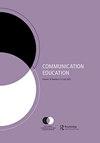一线指导:大学教师的学生创伤和二次创伤压力
IF 0.9
Q3 COMMUNICATION
引用次数: 0
摘要
摘要尽管研究人员承认学生创伤是研究生、临床医生和社会工作者压力的来源,但很少有研究涉及学生创伤对高等教育教师和专业人员的重大影响。经历过创伤或急性压力的学生所需要的支持和指导现在主要落在教师身上。教员们经常见证和扮演学生经历中正在上演的戏剧。这项社会科学调查探讨了教师对学生创伤的暴露、继发性创伤压力和替代性创伤的经历以及应对机制。教师们报告说,个人成就感较低,担心,缺乏持续的社会支持。采用了适应和不适应的应对策略。分析表明,机构对继发性创伤压力和替代性创伤的认识,包括教育和社会支持,是必不可少的。本文章由计算机程序翻译,如有差异,请以英文原文为准。
Instruction on the front lines: student trauma and secondary traumatic stress among university faculty
ABSTRACT While researchers have acknowledged student trauma as a source of stress for graduate students, clinicians, and social workers, little research has grappled with the substantial influence of student trauma on faculty and professionals working in higher education. The support and guidance required by students who have experienced trauma or acute stress now fall largely upon the faculty member. Faculty are often witness to and actors within the unfolding drama of the student experience. This social-scientific inquiry explores faculty exposure to student trauma, the experience of secondary traumatic stress and vicarious trauma, and coping mechanisms. Faculty report feelings of lower personal accomplishment, worry, and lack of sustained social support. Adaptive and maladaptive coping strategies were employed. Analysis suggests institutional recognition of secondary traumatic stress and vicarious trauma, including education and social support, are immanently necessary.
求助全文
通过发布文献求助,成功后即可免费获取论文全文。
去求助
来源期刊

COMMUNICATION EDUCATION
EDUCATION & EDUCATIONAL RESEARCH-
CiteScore
3.10
自引率
34.80%
发文量
47
期刊介绍:
Communication Education is a peer-reviewed publication of the National Communication Association. Communication Education publishes original scholarship that advances understanding of the role of communication in the teaching and learning process in diverse spaces, structures, and interactions, within and outside of academia. Communication Education welcomes scholarship from diverse perspectives and methodologies, including quantitative, qualitative, and critical/textual approaches. All submissions must be methodologically rigorous and theoretically grounded and geared toward advancing knowledge production in communication, teaching, and learning. Scholarship in Communication Education addresses the intersections of communication, teaching, and learning related to topics and contexts that include but are not limited to: • student/teacher relationships • student/teacher characteristics • student/teacher identity construction • student learning outcomes • student engagement • diversity, inclusion, and difference • social justice • instructional technology/social media • the basic communication course • service learning • communication across the curriculum • communication instruction in business and the professions • communication instruction in civic arenas In addition to articles, the journal will publish occasional scholarly exchanges on topics related to communication, teaching, and learning, such as: • Analytic review articles: agenda-setting pieces including examinations of key questions about the field • Forum essays: themed pieces for dialogue or debate on current communication, teaching, and learning issues
 求助内容:
求助内容: 应助结果提醒方式:
应助结果提醒方式:


